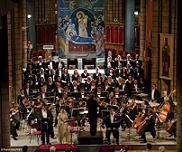It begins like Gounod, to whom the introduction seems to pay homage: slow rhythm, luminous melodies, clear tones, choral singing imbued with restrained fervor. But already, the heart, the absolute sovereign even in paradise, imposes its human law. On Friday, June 4th, at the Monaco Cathedral, the heart of Italian soprano Denia Mazzola Gavazzeni beat in unison with that of Jules Massenet, the author of “Eve,” a biblical mystery in three parts composed in 1875. Entitled “birth of woman,” the first chapter of this oratorio originally intended for ecclesiastical setting inexorably slides towards the romantic passion of two lovers. Once the musical decor worthy of “Mors et Vita” is set, tenor Giuseppe Veneziano, a splendid narrator whose lyrical neutrality in no way undermines his vocal power and perfect diction, announces “the appearance of a woman radiant with beauty.” He calls the man to “rise.” Discovering this “alluring mystery,” Adam, portrayed by baritone Massimiliano Fichera whose beautiful and striking male voice tends towards that of a modulated bass, praises the Creator “by whom the divine work here is completed.”
The superb sensual duet between Adam and Eve, where the heart of soprano Denia Mazzola Gavazzeni opens, like the heroine of Saint-Saëns, to the voice of her partner, already echoes the fervent exaltation of “Manon,” an opera that secured eternal fame for the French composer, winner of the Grand Prix de Rome in 1863, twenty-four years after the one awarded to Charles Gounod: “in your strong hand, I feel my hand tremble,” murmurs Eve in a rush of love. In 1884, Manon will tenderly whisper to Chevalier Des Grieux: “Is it no longer my hand that this hand presses?” As the rhythm of the strings accelerates, the Nice Philharmonic Orchestra and the Chorus of the Nice Opera, in a magistrally initiated harmony by the demanding conductor Daniela Agiman, substitute intense joy for majesty, the human for the divine, despite the unsettling sound of the horn, a distant yet attentive gaze.
During the second and third parts, “temptation” and “fault,” the Italian soprano, after turning to the choir that invites her with forceful and urgent incantations to approach “the tree of knowledge, whose fruit is love” (noting the inversion of the final word compared to the score, allowing for a more enticing vocalization), Eve discovers “desire” and “takes possession of the earth,” accompanied by resounding percussion. Fully abandoned to her Edenic delight, the soprano moves towards vocal ecstasy, delving deep into her technical possibilities to deliver her most vibrant highs. The moving final duet, dedicated “to love, the father of life,” is pure “Manon”: “Do not flee from my languishing arms.” Voluptuous embrace of the two voices, then of the more imploring one of Denia Mazzola Gavazzeni when interrupted by a grating Dies Irae, taken up as a leitmotif reflecting the Almighty’s sanction and the original fall. An ultimate nod from Jules Massenet to the master Hector Berlioz.
For “the ninth year of its existence,” as Father Philippe Blanc reminded in the introduction, the Sacred Music Festival offered this “work created in 1875, the year the first stone was laid to build the Monaco Cathedral.” The fault of Eve, as evidenced by Denia Mazzola Gavazzeni’s performance, seems already forgiven!
NB: *The cultural association Ab Harmonia Onlus, born from the will of Denia Mazzola Gavazzeni, aims jointly to rediscover forgotten works and compositions and to develop a humanitarian activity, including free lyrical concerts in places of suffering or deprivation of freedom. Since September 2009, after Paris and Milan, the Principality hosts the actions of Ab Harmonia Onlus.*
[https://www.abharmoniaeonlus.eu/](https://www.abharmoniaeonlus.eu/)
*Photos: Patrick Gauthey*


